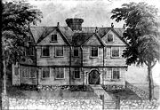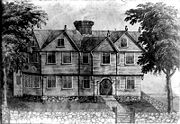
Jonathan Corwin
Encyclopedia
Jonathan Corwin was a wealthy New England
merchant
, and a judge in the Salem, Massachusetts
area who was involved in the Salem Witch Trials
.
He married Elizabeth Gibbs, widow of Robert Gibbs, in 1675 and had ten children. One of them was George Corwin
who after his studies at Harvard became minister at the First Church in Salem. Corwin served as a representative for Salem in the Massachusetts legislature. He was also appointed to the Superior Court of Massachusetts.
, Jonathan Corwin dealt with petty crimes and minor charges such as drunkenness and burglary. He was called to investigate the widespread accusations of witchcraft
in Salem in 1692 and was appointed to be a judge
on the Court of Oyer and Terminer
after another judge Nathaniel Saltonstall
had resigned in protest over the first hanging, the verdict of which had been based on so-called spectral evidence. Spectral evidence was judged to be a legitimate means of identifying a witch as many people believed that the Devil
could not assume an innocent person's shape.
Corwin signed several arrest warrants and transcribed a few of the hearings but scarcity of records from the 1692 events makes it impossible to determine Judge Corwin’s overall import in the trials as well as his attitude towards spectral evidence.
The court of Oyer and Terminer, established by Sir William Phips
, convicted nineteen of witchcraft and sentenced them to the gallows.
 Corwin's house
Corwin's house
is the only remaining structure in Salem with direct ties to the Salem witchcraft trials of 1692. His home is now a museum that focuses on seventeenth-century furnishings, architecture, and lifestyle.
New England
New England is a region in the northeastern corner of the United States consisting of the six states of Maine, New Hampshire, Vermont, Massachusetts, Rhode Island, and Connecticut...
merchant
Merchant
A merchant is a businessperson who trades in commodities that were produced by others, in order to earn a profit.Merchants can be one of two types:# A wholesale merchant operates in the chain between producer and retail merchant...
, and a judge in the Salem, Massachusetts
Salem, Massachusetts
Salem is a city in Essex County, Massachusetts, United States. The population was 40,407 at the 2000 census. It and Lawrence are the county seats of Essex County...
area who was involved in the Salem Witch Trials
Salem witch trials
The Salem witch trials were a series of hearings before county court trials to prosecute people accused of witchcraft in the counties of Essex, Suffolk, and Middlesex in colonial Massachusetts, between February 1692 and May 1693...
.
He married Elizabeth Gibbs, widow of Robert Gibbs, in 1675 and had ten children. One of them was George Corwin
George Corwin
George Corwin was the High Sheriff of Essex County, Massachusetts during the Salem witch trials. He signed warrants for the arrest and execution of those condemned of witchcraft...
who after his studies at Harvard became minister at the First Church in Salem. Corwin served as a representative for Salem in the Massachusetts legislature. He was also appointed to the Superior Court of Massachusetts.
Salem witchcraft trials involvement
As a magistrateMagistrate
A magistrate is an officer of the state; in modern usage the term usually refers to a judge or prosecutor. This was not always the case; in ancient Rome, a magistratus was one of the highest government officers and possessed both judicial and executive powers. Today, in common law systems, a...
, Jonathan Corwin dealt with petty crimes and minor charges such as drunkenness and burglary. He was called to investigate the widespread accusations of witchcraft
Witchcraft
Witchcraft, in historical, anthropological, religious, and mythological contexts, is the alleged use of supernatural or magical powers. A witch is a practitioner of witchcraft...
in Salem in 1692 and was appointed to be a judge
Judge
A judge is a person who presides over court proceedings, either alone or as part of a panel of judges. The powers, functions, method of appointment, discipline, and training of judges vary widely across different jurisdictions. The judge is supposed to conduct the trial impartially and in an open...
on the Court of Oyer and Terminer
Oyer and terminer
In English law, Oyer and terminer was the Law French name, meaning "to hear and determine", for one of the commissions by which a judge of assize sat...
after another judge Nathaniel Saltonstall
Nathaniel Saltonstall
Col. Nathaniel Saltonstall was selected as a judge for the special Court of Oyer and Terminer, a specific court responsible for the trial and sentence of people, mostly women, for the crime of witchcraft in Massachusetts during the Salem Witch Trials of 1692...
had resigned in protest over the first hanging, the verdict of which had been based on so-called spectral evidence. Spectral evidence was judged to be a legitimate means of identifying a witch as many people believed that the Devil
Devil
The Devil is believed in many religions and cultures to be a powerful, supernatural entity that is the personification of evil and the enemy of God and humankind. The nature of the role varies greatly...
could not assume an innocent person's shape.
Corwin signed several arrest warrants and transcribed a few of the hearings but scarcity of records from the 1692 events makes it impossible to determine Judge Corwin’s overall import in the trials as well as his attitude towards spectral evidence.
The court of Oyer and Terminer, established by Sir William Phips
William Phips
Sir William Phips was a shipwright, ship's captain, treasure hunter, military leader, and the first royally-appointed governor of the Province of Massachusetts Bay....
, convicted nineteen of witchcraft and sentenced them to the gallows.
Notable events
- March 1, 1692 - Jonathan Corwin and John HathorneJohn HathorneJohn Hathorne was an executor in the Salem witch trials, and the only one who never repented of his actions. He was also a merchant in Salem, Massachusetts....
examined TitubaTitubaTituba was a 17th-century slave belonging to Samuel Parris of Salem, Massachusetts. Tituba was one of the first three people accused of practicing witchcraft during the Salem witch trials which took place in 1692. Tituba was the first person accused by Betty Parris and Abigail Williams of...
, Sarah GoodSarah GoodSarah Good Born in Salem Village , Massachusetts, was accused of witchcraft in 1692. It has been proved in multiple ways that Sarah Good was falsely accused of witchcraft. She was accused only because of economical and political biases from the families of the accusers...
, and Sarah OsborneSarah OsborneSarah Osborne was one of the first three women to be accused of witchcraft in the Salem witch trials of 1692...
. - May 27, 1692 - Gov. Phips establishes a Court of Oyer and Terminer to investigate the allegations of witchcraft. Lieutenant Gov. William StoughtonWilliam Stoughton (Massachusetts)William Stoughton was a colonial magistrate and admininstrator in the Province of Massachusetts Bay. He was in charge of what have come to be known as the Salem Witch Trials, first as the Chief Justice of the Special Court of Oyer and Terminer in 1692, and then as the Chief Justice of the...
, Nathaniel SaltonstallNathaniel SaltonstallCol. Nathaniel Saltonstall was selected as a judge for the special Court of Oyer and Terminer, a specific court responsible for the trial and sentence of people, mostly women, for the crime of witchcraft in Massachusetts during the Salem Witch Trials of 1692...
, Bartholomew GedneyBartholomew GedneyBartholomew Gedney was a physician and native of Salem, Massachusetts, who participated as a magistrate in the Salem witchcraft trials.Gedney was present at several of the examinations and later served as a member of the Court of Oyer and Terminer. He was present at the examination of his friend...
, Peter SergeantPeter SergeantPeter Sergeant was a merchant in Boston, Massachusetts in the late 17th and early 18th century.-Biography:Born in England, Sergeant moved to Boston and prospered as a merchant. He served as town constable in 1674, and as a Councillor 1692–1703 and 1707–1714...
, Samuel SewallSamuel SewallSamuel Sewall was a Massachusetts judge, best known for his involvement in the Salem witch trials, for which he later apologized, and his essay The Selling of Joseph , which criticized slavery.-Biography:...
, Wait Still Winthrop, John RichardsJohn Richards (colonial judge)John Richards was appointed as a magistrate on the Court of Oyer and Terminer in 1692 by Massachusetts Governor William Phips, and then again as a justice of the Massachusetts Superior Court of Judicature, Court of Assize and general Goal Delivery in 1693, both of which courts heard the cases that...
, John Hathorne and Jonathan Corwin are its members.
The Corwin house

The Witch House
The Witch House , was the home of Judge Jonathan Corwin and is the only structure still standing in Salem, Massachusetts with direct ties to the Salem Witch Trials of 1692. The house was bought by Judge Corwin, in 1675, when he was 24 years old and he lived there for more than forty years. Corwin...
is the only remaining structure in Salem with direct ties to the Salem witchcraft trials of 1692. His home is now a museum that focuses on seventeenth-century furnishings, architecture, and lifestyle.

